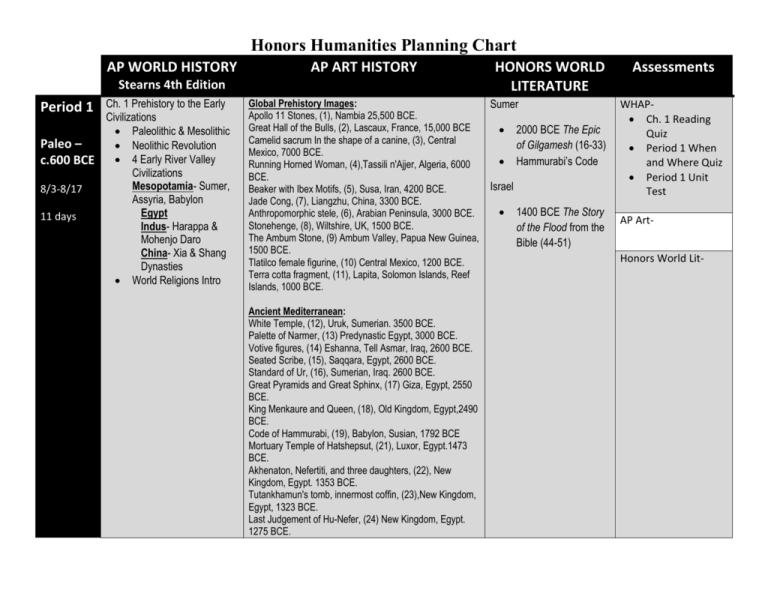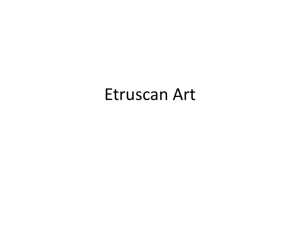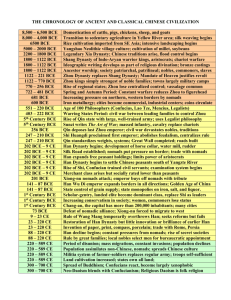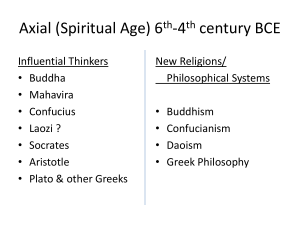Planning Guide - Harrison Humanities
advertisement

Honors Humanities Planning Chart AP WORLD HISTORY AP ART HISTORY Stearns 4th Edition Ch. 1 Prehistory to the Early Civilizations Paleolithic & Mesolithic Paleo – Neolithic Revolution c.600 BCE 4 Early River Valley Civilizations Mesopotamia- Sumer, 8/3-8/17 Assyria, Babylon Egypt 11 days Indus- Harappa & Mohenjo Daro China- Xia & Shang Dynasties World Religions Intro Period 1 Global Prehistory Images: Apollo 11 Stones, (1), Nambia 25,500 BCE. Great Hall of the Bulls, (2), Lascaux, France, 15,000 BCE Camelid sacrum In the shape of a canine, (3), Central Mexico, 7000 BCE. Running Horned Woman, (4),Tassili n'Ajjer, Algeria, 6000 BCE. Beaker with Ibex Motifs, (5), Susa, Iran, 4200 BCE. Jade Cong, (7), Liangzhu, China, 3300 BCE. Anthropomorphic stele, (6), Arabian Peninsula, 3000 BCE. Stonehenge, (8), Wiltshire, UK, 1500 BCE. The Ambum Stone, (9) Ambum Valley, Papua New Guinea, 1500 BCE. Tlatilco female figurine, (10) Central Mexico, 1200 BCE. Terra cotta fragment, (11), Lapita, Solomon Islands, Reef Islands, 1000 BCE. Ancient Mediterranean: White Temple, (12), Uruk, Sumerian. 3500 BCE. Palette of Narmer, (13) Predynastic Egypt, 3000 BCE. Votive figures, (14) Eshanna, Tell Asmar, Iraq, 2600 BCE. Seated Scribe, (15), Saqqara, Egypt, 2600 BCE. Standard of Ur, (16), Sumerian, Iraq. 2600 BCE. Great Pyramids and Great Sphinx, (17) Giza, Egypt, 2550 BCE. King Menkaure and Queen, (18), Old Kingdom, Egypt,2490 BCE. Code of Hammurabi, (19), Babylon, Susian, 1792 BCE Mortuary Temple of Hatshepsut, (21), Luxor, Egypt.1473 BCE. Akhenaton, Nefertiti, and three daughters, (22), New Kingdom, Egypt. 1353 BCE. Tutankhamun's tomb, innermost coffin, (23),New Kingdom, Egypt, 1323 BCE. Last Judgement of Hu-Nefer, (24) New Kingdom, Egypt. 1275 BCE. HONORS WORLD LITERATURE Sumer 2000 BCE The Epic of Gilgamesh (16-33) Hammurabi’s Code Israel 1400 BCE The Story of the Flood from the Bible (44-51) Assessments WHAP Ch. 1 Reading Quiz Period 1 When and Where Quiz Period 1 Unit Test AP ArtHonors World Lit- Ch. 2 Classical China Zhou Dynasty Warring States Period c.600 BCE Confucianism -Mandate of Heaven - c.600 CE Qin Dynasty -Qin Shi Huang Di 8/18-9/14 -Legalism Daoism 19 days -Yellow Turbans Han Dynasty -Wu Ti Period 2 Ch. 3 Classical India Aryans Hinduism -Caste system Mauryan Dynasty -Chandragupta Maurya -Ashoka -Buddhism Gupta Dynasty Ch. 4 Classical Mediterranean Greece -Persian War -Zoroastrianism -Athens & Sparta -Peloponnesian War -Pericles Alexander the Great -Hellenism Rome Temple of Amun-Re at Karnak, (20), Luxor, Egypt. 1250 BCE. Lamassu, (25), Neo-Assyrian, Khorsobad, 720 BCE. Audience Hall, Persepolis, (30), Iran, 520 BCE. Ancient Mediterranean: Athenian agora, (26) Archaic through Hellenistic Greek, 600 BCE. Anavysos Kouros, (27), Archaic Greece, 530 BCE. Peplos Kore, (28), Archaic Greece, 530 BCE. Sarcophagus of the Spouses, (29), Etruscan, 520 BCE. Temple of Minerva, Apollo sculpture,(31), Italy, 510 BCE. Tomb of the Triclinium, (32), Tarquinia, Italy, 480 BCE. Niobides Krater, (33), Classical Greece, 460 BCE. Doryphoros, (34) Classical Greece, 450 BCE. Acropolis, (47), Athens, Greece, 447 BCE. Grave Stele of Hegaso, (36), Greece, 410 BCE. Winged Victory of Samothrace, (37), Hellenistic Greece, 175 BCE. Altar of Zeus and Athena, (38), Hellenistic Greece, 175 BCE. Alexander Mosaic, (40), Pompeii, Italy, 100 BCE. Seated Boxer, (41), Hellenistic Greece, 100 BCE. Head of a Roman Patrician, Republican Roman, 75 BCE. House of the Vettii, (39), Pompeii, Italy, 62 BCE. Augustus of Primaporta, (43),Imperial Rome, 5 CE. Colosseum, (44), Rome, Italy, 70 CE. Forum of Trajan, (45), Rome, Italy, 106 CE. Pantheon, (46), Imperial Roman, 118 CE. Catacomb of Priscilla, (48), Rome, Italy, 200 CE. Ludovisi Battle Sarcophagus, (47), Late Imperial Roman, 250 BCE. Santa Sabina, (49), Rome, Italy, 422 CE. Petra, Jordan, (181), 400 BCE. China: Terra cotta warriors from the first Qin emperor of China, Qin Dynasty, (193), 100 BCE. Funeral banner of Lady Dai, (194), Han Dynasty, China, 180 BCE. Longmen caves, Luoyang, China, (195), 493 BCE. Classical China 500 BCE The Analects by Confucius (268-270) Classical India 300 BCE The Ramayana (208-216) 200 BCE The Mahabharata (192199) 200 BCE The Bhagavad Gita (200207) Siddhartha by Herman Hesse (novel) Greece & Rome 800 BCE The Iliad by Homer (363409) 450 BCE Pericles' Funeral Oration by Thucydides (424433) WHAP Ch. 2, 3, & 4 Reading Quizzes Period 2 When and Where Quiz Period 2 Unit Test AP Art- Honors World LitIndian Philosophy Essay -Republic -Punic Wars -Julius Caesar -Empire Christianity India: Great Stupa at Sanchi, India, (192), 300 BCE. Africa: Ch. 5 Directions, Diversities, & Declines by 500 C.E. Kush Axum & Ethiopia Japan -Shintoism Polynesia -Fiji, Samoa, & Hawaii Period 3 c.600 CE c.1450 CE 9/15-11/16 40 days Ch. 6 Rise and Spread of Islam Bedouins Muhammad 5 Pillars Umayyad Empire Abu Bakr Sunni & Shi'a Split -Caliph Succession Dispute Abbasid Dynasty Ch. 7 Abbasid Decline & Spread of Islam Late Abbasids -Harun al-Rashid Seljuk Turks Art, Literature, Science Mongol threats Spread to South Asia -Indian Influences Byzantine/Medieval Europe: Islam 400 BCE Oedipus Rex by Sophocles (462-525) 300 BCE The Apology by Plato (438-457) 50 BCE The Aeneid by Virgil (532-545) WHAP650 CE Qur'an (76 Ch. 6, 7, 8, 9, 10, Rebecca and Eliezer at the Well and Jacob Wrestling the 81) 11, 12, 13, 14 Angel, Vienna Genesis,(50), Early Byzantine, Europe, 500 China Reading Quizzes CE. 1000 CE The Pillow Period 3 When San Vitale,(51), Ravenna, Italy, 526 CE. Book by Sei Hagia Sophia, (52), Constantinople, 532 CE. and Where Quiz Shonagon (306Merovingian looped fibula, (53), Early Medieval Europe, Period 3a & b 313) 550 CE. Unit Tests Persia Virgin and Child between Saints Theodore and AP ArtGeorge,(54), Early Byzantine Europe, 600 CE. 1070 CE The Lindisfarne Gospels: St. Matthew, cross carpet page,(55), Rubaiyat by Omar St. Luke, Early Medieval Europe, 700 CE. Khayyam (100-105) Bayeux Tapestry, (59) Romanesque Europe, 1066 CE. Italy Honors World LitChurch of Sainte-Foy,(58) Conques, France, 1130 CE. 1300 CE The Chartres Cathedral, (60), Chartres, France, 1145 CE. Inferno by Dante Dedication Page with Blanche of Castille and King Louis IX, Alighieri (656-691) (61), Gothic Europe, 1194 CE. Rottgen Pieta,(62), Late Medieval Europe, 1300 CE. Arena Chapel, (63), Giotto, Padua, Italy, 1303 CE. Golden Haggadah, (64), Late medieval Spain, 1320 CE. Pazzi Chapel, (67), Brunelleschi, Florence, Italy, 1429 CE. Merode Altarpiece, (66), Robert Campin, 1432 CE. -Sufis Mongol Invasions Ch. 8 Africa & Spread of Islam Stateless societies Bantu migrations Islam in N. Africa Ghana Mali -Sundiata -Ibn Battuta -Mansa Musa Songhai -Sunni Ali -Muhammad the Great Nubia & Ethiopia -Christianity Swahili Coast -Trade and Islam Nok, Yoruba, Benin Kongo & Great Zimbabwe Ch. 9 Byzantium and Orthodox Europe Byzantine Empire -Constantine -Justinian & Theodora Great Schism -Iconoclasm Eastern Europe Kievan Rus -Rurik -Vladimir I -Boyars -Mongols/Tatars Ch. 10 Medieval Europe The Arnolfini Portrait, (68), Jan Van Eyck, 1434 CE. Africa: Conical tower and circular wall of Great Zimbabwe, (167), Africa, 100 CE. Great Mosque of Djenne, (168), Mali, 1200 CE. West and Central Asia: a. Islam: The Kaaba, (183), Mecca, Saudi Arabia, 631 CE. Dome of the Rock, (185), Jerusalem, 691 CE. Great Mosque, (186), Isfahan Iran, 700 CE. Folio from a Qur'an, (187), North Africa or Near East, 700 CE. Great Mosque, (56) Cordoba, Spain, 785 CE. Pyxis of al-Mughira, ( 57) Umayyad, 968 CE. Basin, Baptistery of St. Louis, (188), 1320 CE. Alhambra, (65), Granada, Spain, 1354 CE. b. Buddhism Jowo Rinpoche,(184), Lhasa, Tibet, 641 CE. Borobudur Temple (198), Central Java, Indonesia, 750 CE. Angkor, the temple of Angkor Wat and the city of Angkor Thom, (199), Cambodia, 800 CE. China: Travelers among Mountains and Streams, (201) Fan Kuan, 1000 CE. The David Vases, (204), Yuan Dynasty, China, 1354 CE. Forbidden City, (206) Beijing, China, 1400 CE. Japan: Todai-ji, (197), Nara, Japan, 743 CE. Night Attack on the Sanjo Palace, (203), Kamakura Period, Japan, 1250 CE. South Asia: Buddha, Bamiyan, (182), Afghanistan, , 400 CE. Gold and jade crown, (196), Korea, 550 CE. Shiva as Lord of Dance, (202) Hindu, India, 1000 CE. Vikings Feudalism, Manorialism, & the Church Franks -Clovis -Martel -Charlemagne Holy Roman Empire England -William the Conqueror -John/Magna Carta Crusades -Urban II -Saladin -Go back to Ch. 7 for Impact on Middle East -Results/Trade Thomas Aquinas -Scholasticism Hundred Years War War of the Roses Ch. 11 Americas on the Eve of Invasion Ch. 12 Reunification and Renaissance: The Era of the Tang and Song Dynasties Ch. 13 Spread of Chinese Civilization: Japan, Korea, and Vietnam Ch. 14 Last Great Nomadic Challenges: From Chinggis Khan to Timur Ch. 15 West and the Changing World Balance Bahram Gur Fights the Karg,(189), Persian, 1330 CE. Korea: Portrait of Sin Sukju, (205), Korea, 1417 CE. Period 4 c. 1450 c. 1750 11/17-1/25 31 days Period 5 Ch. 16 The World Economy Ch. 17 The Transformation of the West Ch. 18 The Rise of Russia Ch. 19 Early Latin America Ch. 20 Africa and the Africans in the Age of the Atlantic Slave Trade Ch. 21 The Muslim Empires Ch. 22 Asian Transitions in an Age of Global Change Arabia 1500 CE The David, (69), Donatello, 1440 CE. Thousand and One Palazzo Rucellai, (70), Leon Battista Alberti, Florence, Italy, Nights (84-97) 1450 CE. England Renaissance: Madonna and Child with Two Angels, (71), Fra Fillipo Lippi, 1465 CE. Birth of Venus, (72), Sandro Botticelli, 1484 CE. Last Supper, (73),Leonardo Da Vinci, 1494 CE. Adam and Eve, (74), Albrecht Durer, 1504 CE. Sistine Chapel, (75), Michelangelo, Vatican City, 1508 CE. School of Athens, (76), Raphael, Vatican City, 1509 CE. Isenheim altarpiece, (77), Matthias Grunewald, 1512 CE. Emtombment of Christ,(78), Jacopo Pontormo, 1525 CE. Allegory of Law and Grace, ( 79), Lucas Cranach the Elder, 1530 CE. Venus of Urbino, ( 80), Titian, 1538 CE. Hunters in the Snow, (83), Pieter Brueghel the Elder, 1565 CE. Self Portrait with Saskia, (87) Rembrandt, 1636 CE. San Carlo Alle Quattro Fontane, (88), Borromini, Rome, Italy, 1646 CE. Ecstasy of St Theresa,(89), Bernini, Rome, Italy, 1647 CE. Las Meninas, ( 91), Diego Velazquez, 1656 CE. Woman Holding Balance, (92), Johannes Vermeer, 1164 CE. Palace of Versailles, (93), Versailles, France, 1669 CE. Fruit and Insects, (96), Rachel, Ruysch, 1711 CE. The Tete a Tete, from Marriage a la Mode,(98), Willliam Hogarth, 1743 CE. Enlightenment, Rococo, Romanticism, Neoclassical, and Realism: 1580s CE Sonnets by William Shakespeare (740741) WHAP Ch. 16, 17, 18, 19, 20, 21, 22 Reading Quizzes Period 4 When and Where Quiz Period 4a & b Unit Tests AP Art- Spain 1600 CE Don Quixote by Miguel de Cervantes (768785) Honors World Lit- Japan 1670 CE Haiku by Basho (300) France 1740 CE Candide by Voltaire (800807) Germany WHAP- c. 1750 c. 1900 1/26-3/7 25 days Ch. 23 The Emergence of Industrial Society in the West, 1750-1914 Ch. 24 Industrialization and Imperialism: The Making of the European Global Order Ch. 25 The Consolidation of Latin America, 1830-1920 Ch. 26 Civilizations in Crisis: The Ottoman Empire, the Islamic Heartlands, and Qing China Ch. 27 Russia and Japan: Industrialization Outside the West A Philosopher Giving a Lecture on the Orrery, (100), Joseph Wright of Derby, 1763 CE. The Swing, (101), Jean-Honore Fragonard, 1767 CE. Monticello, Thomas Jefferson, 1768 CE. The Oath of the Horatii, (103) Jacques-Louis David, 1784 CE. George Washington, (104), Jean-Antoine Houdon, 1788 CE. Self Portrait, (105), Elisabeth Louise Vigee Lebrun, 1790 CE. Y no hai remedio, (106), Francisco de Goya, 1810 CE. La Grande Odalisque, (107) Jean-Auguste Dominique Ingres, 1814 CE. Liberty Leading the People, (108) Eugene Delacroix,1830 CE. The Oxbow, (109), Thomas Cole, 1836 CE. Still Life in Studio, (110), Jacques-Mande Daguerre, 1837 CE. Slave Ship, (111), Joseph Mallord William Turner, 1840 CE. Palace of Westminster, (112), Charles Barry and Augustus W.N. Pugin, London, England, 1840 CE. The Stone Breakers, (113), Gustave Courbet, 1849 CE. Nadar Raising Photography, (114), Honore Daumier, 1862 CE. Olympia,(115), Edouard Manet, 1863 CE. The Horse in Motion,(117), Eadweard Muybridge, 1878 CE. Impressionism, Post-Impressionism, Beginnings of Modernism: The Saint-Lazare, (116), Claude Monet, 1877 CE. The Burghers of Calais, (119), Auguste Rodin, 1884 CE. The Starry Night, (120), Vincent Van Gogh, 1889 CE. The Coiffure, (121), Mary Cassatt, 1890 CE. The Scream, (122), Edvard Munch, 1893 CE. Where Do We Come From? What Are We? Where Are We Going? (122), Paul Gauguin, 1897 CE. 1800 CE Faust by Johann Wolfgang von Goethe (844863) Ch. 23, 24, 25, 26, 27 Reading Quizzes Period 5 When and Where Quiz Period 5 Unit Test AP Art- Russia 1890 CE How Much Land Does a Man Need? by Leo Tolstoy (913-927) 1890 CE A Problem by Anton Chekhov Honors World Lit(928-936) Norway 1860 CE A Doll's House by Henrik Ibsen (940-998) Carson, Pirie, Scott and company Building, (124), Louis Sullivan, Chicago, Illinois, 1899 CE. Period 6 c. 1900 Present 3/8-4/29 33days Ch. 28 Descent into the Abyss: World War I and the Crisis of the European Global Order Ch. 29 The World in the 1920s: Challenges to European Dominance Ch. 30 The Great Depression and the Authoritarian Response Ch. 31 A Second Global Conflict and the End of the European World Order Ch. 32 Western Society and Eastern Europe in the Decades of the Cold War Ch. 33 Latin America: Revolution and Reaction Into the 21st Century Ch. 34 Africa, the Middle East, and Asia in the Era of Independence Ch. 35 Rebirth and Revolution: Nation-Building in East Asia and the Pacific Rim Ch. 36 Globalization and Resistance: World History 1990-2003 Modernism: Austria-Hungary (Czech Republic) WHAP Ch. 28, 29, 30, Mont St Victoire, (125), Paul Cezanne, 1902 CE. 31, 32, 33, 34, The Women of Avignon, (126), Pablo Picasso, 1907 CE. 1900 CE The 35, 36 Reading The Steerage, (127), Alfred Stieglitz, 1907 CE. Metamorphosis by Quizzes The Kiss, (128), Gustav Klimt, 1907 CE. Franz Kafka (1064The Kiss, (129), Constantin Brancusi, 1907 CE. Period 6 When The Portugese, (130), Georges Braques, 1911 CE. and Where Quiz 1109) Goldfish, (131), Henri Matisse, 1912 CE. World Wars Unit Improvisation 28, (132), Vassily Kandinsky, 1912 CE. France Test Self Portrait as a Soldier, (133), Ernst Ludwig Kirchner, Cold War and 1915 CE. 1940 CE The Guest Beyond Unit Memorial Sheet for Liebknecht, (134), Kathe Kollwitz, 1919 by Albert Camus CE. Test (1230-1247) Villa Savoye, (135), Le Corbusier, 1929 CE. AP ArtComposition with Red, Blue and Yellow, (136), Piet Mondrian, 1930 CE. Illustration from The Results of the First Five year Plan, (137), Varvara Stepanova, 1932 CE. Object, (138), Meret Oppenheim, 1936 CE. Fallingwater, (139), Frank Lloyd Wright, 1936 CE. The Two Fridas, (140), Frida Kahlo, 1939 CE. Migration of the Negro, Panel no. 49, (141), Jacob Lawrence, 1940 CE. The Jungle, (142), Wilfredo Lam, 1943 CE. Dream of a Sunday Afternoon in the Alameda Park,(143), Diego Rivera, 1947 CE. Fountain, (144), Marcel Duchamp, 1950 CE. Woman I, (145), Willem de Kooning, 1950 CE. Seagram Building, (146), Ludwig Mies van der Roheand Philip Johnson, New York City, 1954 CE. Post-Modernism: Marilyn Diptych, (147), Andy Warhol, 1962 CE. The Bay, (149), Helen Frankenthaler, 1963 CE. Narcissus Garden,(148), Kusama, 1969 CE. Lipstick, (150), Claes Oldenburg, 1969 CE. Russia 1950 CE Freedom Honors World Litto Breathe by Aleksandr Solzhenitsyn (12881294) Columbia 1960 CE The Handsomest Drowned Man in the World by Gabriel Garcia Marquez (12001211) Chairman Mao en Route to Anyuan, (212), 1969 CE. Spiral Jetty, (151), Robert Smithson, Great Salt Lake, Utah, 1970 CE. House in New Castle Country, Robert Venturi, (152), Delaware 1978. The Gates, (224), Christo and Jean-Claude, New York, 1979 CE. Vietnam Veterans Memorial, (225), Maya Lin, Washington D.C., 1982 CE. Horn Players, (226), , 1983 CE. Jean-Michel Basquiat Summer Trees, (227), Song Su-nam, 1983 CE. Androgyn III, (228), Magdalena Abakanowicz, 1985 CE. A Book from the Sky, (229), Xu Bing, 1987 CE. Pink Panther,(230), Jeff Koons, 1988 CE. Untitled #228, 231), Cindy Sherman, 1990 CE. Dancing at the Louvre, (232), Faith Ringgold, 1991 CE. Trade, (233), Jaune Quick-to-See Smith, 1992 CE. Earth's Creation, (234), Eily Kame Kngwarreye, 1994 CE. Rebellious Silence, (235), Shirin Neshat, 1994 CE. En la barberia no se Llora, (236), Pepon Osorio, 1994 CE. Pisupo Lua Afe, (237), Michel Tuffery, 1994 CE. Electronic Superhighway, (238), Nam June Paik, 1995 CE. The Crossing, (239), Bill Viola, 1996 CE. Guggenheim Museum,(240), Bilbao, Spain, Frank Gehry, 1996 CE. Pure Land, (241), Mariko Mori, 1998 CE. Lying with the Wolf, (242), Kiki Smith, 2001 CE. Darkytown Rebellion, (243), Kara Walker, 2001 CE. Nigeria 1970 CE Things Fall Apart by Chinua Achebe (novel) The Swing, ( 244), Yinka Shonibare, 2001 CE. Old Man's Cloth, (245), El Anatsui, 2003 CE. Stadia II, (246), Julie Mehretu, 2004 CE. Preying Mantra, ( 247), Wangechi Mutu, 2006 CE. Shibboleth, (248), Doris Salcedo, 2007 CE. MAXII National Museum, ( 249), Zaha Hadid, Rome Italy, 2009 CE. Sunflower Seeds, (250), Ai Weiwei, 2010 CE.


